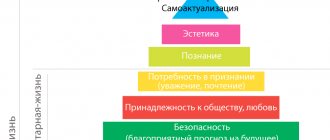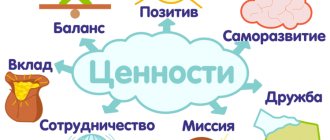Deviant behavior is any behavior that deviates from social norms. The key point is that norms are set in relation to a particular society. Therefore, behavior that is normal for some people is considered undesirable in another culture.
There is no generally accepted classification of types of deviant behavior. Below are several different classifications depending on the characteristics taken as a basis.
According to the goals pursued by the individual, deviant behavior occurs:
- selfish orientation - the desire to obtain selfish material gain through dishonest actions or offenses (theft, deception, fraud, speculation);
- aggressive orientation – crimes against the person (rape, murder, beatings, insults);
- socially passive orientation - avoidance of fulfilling social normative responsibilities, avoidance of an active lifestyle and solving necessary problems (absenteeism from work and school, various types of addiction, vagrancy, suicidal thoughts).
In terms of results, deviations from the norm are:
- positive – the individual’s actions are aimed at overcoming outdated standards and contribute to changes in the social system for the better;
- negative – human actions are aimed at destroying the social system, leading it to dysfunction and disorganization.
Some experts divide deviant behavior into the following types:
- antisocial (delinquent) – a person’s actions contradict legal, moral, ethical and cultural norms;
- asocial - an individual commits actions that do not correspond to the social and legal norms of the society in which he lives, as well as customs and traditions;
- self-destructive - such behavior threatens the development and integrity of the personality itself.
Deviant behavior in childhood and adolescence may include a combination of several types or manifest itself in only one. Such changes can appear very early due to congenital causes, arise as a result of physical injuries that affect brain activity and neurological condition, or be formed during the process of upbringing or under the influence of unfavorable social and psychotraumatic factors.
The assessment of one's actions in children and adolescents can also be different. Some feel guilty, which causes their self-esteem to drop and neuroses to appear. Others consider their behavior normal and justify it, even if society considers it deviations from the norm.
Deviant behavior of children
Problems in upbringing, disobedience and aggressive aspects of behavior force parents to think about the mental state of the child at an early age.
The causes of deviant behavior in children are quite diverse:
- Biological – include intrauterine lesions (toxic effects, asphyxia, etc.), hereditary diseases that provoke delays in physical and mental development, and damage to the nervous system. This also includes somatic and mental disorders received by the child in the first years of life (traumatic brain injuries, frequent stress, etc.).
- Social – reflect different levels of ill-being of the surrounding people. This includes alcoholism of relatives (for example, a young family lives in the same apartment with a drinking grandfather), excessive conflict, and domestic violence. All this provokes the child to adjust his behavior in accordance with antisocial norms. An incomplete family can also influence deviant behavior, since the child has a deficit of role and behavioral reactions that should be borrowed from the corresponding family member.
- Pedagogical - this includes the abuse of prohibitions, lack of explanations for punishments, which in turn causes a protest reaction on the part of the child. Also, deviant behavior develops as a result of a standardized approach to treating children in preschool and school institutions, where individual characteristics are not taken into account.
- Psychological – features of upbringing in the family that adversely affected the emotional-volitional sphere of the child, for example, upbringing according to the “family idol” type, hyper- or hypoprotection, domestic violence, parental alcoholism. Psychological reasons also include a violation of attachment to adults.
If there are medical indications, then therapy should be carried out as early as possible. In the case of social and pedagogical reasons, it makes sense to think about changing the strategy of adult behavior.
In the same way, psychological reasons require immediate correction. If deviant behavior is ignored in childhood, then it is consolidated and becomes more stable, flowing into adolescence.
Deviant and mentally retarded are not the same thing
Even representatives of medicine, psychology and pedagogy interpret manifestations of deviant behavior differently, let alone people who are far from scientific terminology. Therefore, when the administration of a comprehensive school offers parents a transfer to a special school for children with deviant behavior, they often panic. Consciousness instantly draws eerie images of a closed colony school behind barbed wire or a boarding school for children with mental disabilities. However, deviant behavior can be characteristic of even a very gifted child, who causes a lot of trouble for teachers and parents with his hyperactivity.
The older generation understands the term “difficult” teenager much more clearly, but during the reform of the education system, this concept has lost its relevance and is under an unspoken ban. Now there are children who find themselves in difficult life situations or “social risk groups.” But this did not make it any easier for teachers. In fact, transfer from a general education school to a special one is a rare case, because the number of such children increases every year. If a child from a completely prosperous family, but with a weak character, suddenly succumbs to bad influence, then parents often realize this fact and try, together with the school, to correct the situation. But what to do with families where deviant behavior is the norm for all members of the household?
Deviant behavior of adolescents
Deviant behavior in adolescence is more dangerous than in childhood. Firstly, because a teenager can commit more destructive actions. Secondly, because correcting such phenomena requires active action and a long time.
The causes of deviant behavior in adolescents can begin in early childhood, or may develop later under the influence of a peer group or due to a change in environment, maladjustment (for example, due to the breakdown of a family, the loss of a loved one, etc.).
The most common forms of deviant behavior among adolescents:
- destructive-aggressive - it is characterized by radical and even rebellious actions of the individual in order to establish new orders in the environment where he is located, this can be a family or boarding school, orphanage, as well as changing the activities of a social group or his place in it (class in school, a group at a club or in a sports section, a gangster group on the street, etc.).
- destructive-compensatory - a milder form of deviant behavior in which a teenager tries to take a desired place in society or achieve certain changes in his social status. In contrast to the destructive-aggressive form of behavior, in this case a person most often gives in to his principles and beliefs, falling under the influence of a certain social group. This may be submission to the rules of informal groups in exchange for their friendship, protection, recognition or material support. For example, a teenager who has not previously tried cigarettes or alcohol or has not used obscene language begins to use them. Joins in bullying someone outside the group or takes a passive position, not trying to protect the victim from attacks from peers.
- compensatory-illusory - aimed at relieving psychological discomfort and dissatisfaction with the current state of affairs with the help of psychoactive substances. There is no opposition to society; the teenager chooses to isolate himself from it or artificially change the existing perception.
Correcting the latter form of deviance usually causes the greatest difficulties, since in addition to psychological characteristics, it is also necessary to solve the problem of addiction.
Prevention of deviant behavior
Preventive measures should be aimed at identifying children at risk, eliminating factors contributing to the development of deviations, as well as providing timely assistance.
In order to stabilize the emotional and behavioral spheres in children and adolescents, it is necessary:
- To develop an interest in the world around us and people, a desire to study and understand the patterns of people’s reactions and the functioning of society. This needs to be done not only in educational institutions, but above all in the family.
- Introduce the child to the appropriate rules of behavior in various life situations. For kids, it is possible to consolidate the necessary skills in a playful way; for teenagers, training classes are suitable.
- Develop adequate self-perception and self-esteem, which subsequently makes it possible to navigate in any situation and choose appropriate behavior from those strategies that were successfully learned earlier.
- Develop communication skills in various forms for any situation, as well as with different categories of people. The more practice a person receives, the higher the likelihood of subconsciously using the correct strategy in a real situation.
- Parents should pay attention to intrafamily interaction and the psycho-emotional atmosphere in the family. Develop mutual understanding and parenting competence.
For categories of children and adolescents who have undergone correctional programs, it is necessary to prevent a return to previous forms of interaction. The key points here will be practicing the acquired skills and appropriate moral and psychological support.
First characteristic
The name is studied at school from the 1st grade according to the educational instruction “_________”. During his studies he showed average abilities. He attends school regularly and is rarely sick.
The third grade finished with a “3”. From the beginning of 4th grade, learning difficulties began to increase. Based on the results of the 1st and 2nd quarters, he is an underachiever. Shows no desire to work in class.
Formation of study skills
Russian language. Spelling skills have not been developed. When taking dictation and copying, he makes many mistakes, some of them due to inattention. Doesn't listen to teacher's recommendations to check work. Doesn't complete grammar tasks. He rarely does written work in class, often limiting himself to a few lines. The material covered was not mastered.
Reading. Reading technique is below normal. He reads little and finds it difficult to retell the text. He learns by heart well. According to my mother, she prepares for oral subjects, but does not retell them in class and does not show her knowledge.
Mathematics. The multiplication table has been partially mastered. In this regard, it is difficult for him to perform written multiplication and division techniques. Can't solve problems. Doesn’t make an effort to read the task thoroughly or understand its content. Rarely works in class and cannot cope with tests. Does not complete tasks requiring mental actions. Knowledge gaps are not being closed.
Physical training. During lessons, he often does not comply with the teacher’s requirements, violates discipline, does not study, and does not follow safety precautions.
I am not always ready for labor and fine arts lessons. Never finishes work. He does his work at home with his mother.
He keeps his notebooks carelessly. Treats school supplies carelessly. He often breaks pens, crumples notebooks, and tears covers.
He completes homework under the supervision of his mother and does not work independently. Preparing for lessons takes a lot of time, because there is no perseverance; he constantly finds an excuse to rest.
At this time he is not doing well in Russian, mathematics, and English. Doesn't work in class. Cannot concentrate on the material being studied. Shows no interest in the lesson. If he works, he gets tired very quickly.
Emotional and behavioral characteristics:
The child is easily excitable and unbalanced. It may be difficult to independently control your behavior. Constantly violates discipline. Every lesson screams, talks, laughs, yells, shouts words that are unpleasant for others, creates noise by any means. With his behavior he tries to attract the attention of other children. He cannot sit quietly in a chair. Either he swings on a chair, or rides on it, or lies on a desk. Can crawl on the floor. At every lesson you are asked to leave. Doesn't let me teach lessons. In 3rd grade and at the beginning of the school year, he calmed down a little and began to work if the teacher stood next to him. Now it doesn't calm down at all. Doesn't respond to any comments. The administration's conversations with him have no effect and do not produce results.
Features of communication: the name communicates with individual children in the class. Despite inappropriate behavior, children do not reject the name and take it into their games. During this time he may not control his actions, hit, push. During breaks, he violates the norms of behavior.
The boy is being brought up in a single-parent family. Mom constantly cooperates with the teacher and tries to follow the teacher’s recommendations.
Conclusion and recommendations of the teacher:
Studying in a regular group does not provide the opportunity to assimilate the material being studied in full. The child requires more help and attention from the teacher for teaching, control and upbringing than a teacher can provide in a general education class.
Examples of deviant behavior and the correct reaction of parents
One of the common examples with which parents turn to a psychologist is when a child behaves aggressively for no apparent reason or makes scandals.
The most effective response on the part of adults, preventing the recurrence of such manifestations, will be its complete absence. Those. even if a child falls to the floor, chokes in hysterics and screams all over the street, the parent should start talking to him only after he has completely calmed down. Thus, self-control is trained and behavior is reinforced, in which the baby understands that he will be listened to only if he behaves normally.
Absenteeism from school and systematic failure to complete assignments should not cause an excessive reaction on the part of parents, but they also cannot be ignored. This form may be a way to attract attention from the family, or it may arise as a result of psychological difficulties that have arisen in the school community. Here it is important to calmly discuss with the child the reasons for this behavior, without interrogating or hinting at punishment. The main thing is to let the child understand that you are at the same time, that is, you are even ready to write a note to the class teacher if a banal rest will correct the situation.
In case of offenses and/or evidence of drug use, drastic measures are necessary to suppress this type of behavior, including changing the place of residence, if there are no other opportunities to change the child’s social circle. It is also necessary to carefully study the reasons for this behavior and eliminate them, since without removing the “root” of the problem, its recurrence is very likely.
Characteristics of a type 8 student with deviant behavior
Characteristic
For a 5th grade student
Lapin Roman Nikolaevich born January 31, 2007,
residing at the address: s. Savkino, st. Leskova 92.
Roman lives with his aunt, Yulia Nikolaevna, and sister Alina in a private house. The grandmother, guardian Nina Ivanovna, visits the boy every day and controls him. Housing and living conditions in the family are satisfactory. Relationships with sister, mother and grandmother are calm, respectful and trusting. Both grandmother and mother always make contact with teachers.
During his studies in the 5th grade he showed very weak abilities. He does not always understand the educational material, but homework is always completed, and he is included in the work sporadically during lessons. Prepares oral subjects, can retell a short text, but does not volunteer to answer. Roma’s reading technique is below the standard for 5th grade; the meaning of the text he reads is not always clear to the guy. In lessons he is reserved and calm. Behaves passively. Written work is sloppy, careless, often crosses out everything if he writes from dictation, but he copies from the textbook very carefully. Roman draws very well. Homework is always done under the supervision of an aunt or grandmother. Always has school supplies with him and in good condition.
He is inattentive in class. If Roman doesn’t like something or doesn’t understand it, he can run away from the class and hide. Remarks from teachers have no effect on him, the guy constantly cries. When finding out the reason for the tears, the explanations are the same: “Everyone offends me..., they look at me wrong..., and he wanted to offend me...”
Very often, almost every day, Roman and the guys have conflicts. Roma hits his classmates with particular cruelty and can also hit high school students. He never admits his guilt. Frequent conversations between the class teacher, subject teachers and the social worker with the child about violations of the rules of conduct do not produce results; the guy simply does not understand the meaning of what was said. In Roman's class, many children try to stay away so as not to fall under the hot hand, because... the student is much stronger than his classmates. He just hits because he “feels like he’s about to get hit.” This quarter, I got so angry for some unknown reason that I threw an open pencil case with a compass at a classmate. When finding out the reasons for the aggression, he explained that the girl “looked at him the wrong way.”
Presents but does not participate in activities during school hours. After lunch, on holidays or for some kind of mass work, he never comes.
The guy has no friends or good acquaintances. At home he communicates only with relatives. The appearance is always neat. He gets sick very rarely. He always misses classes only for a good reason.
School director:__________/A.A. Baiguzhinov/
Class teacher: _____/S. V.Zhuravleva/











